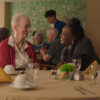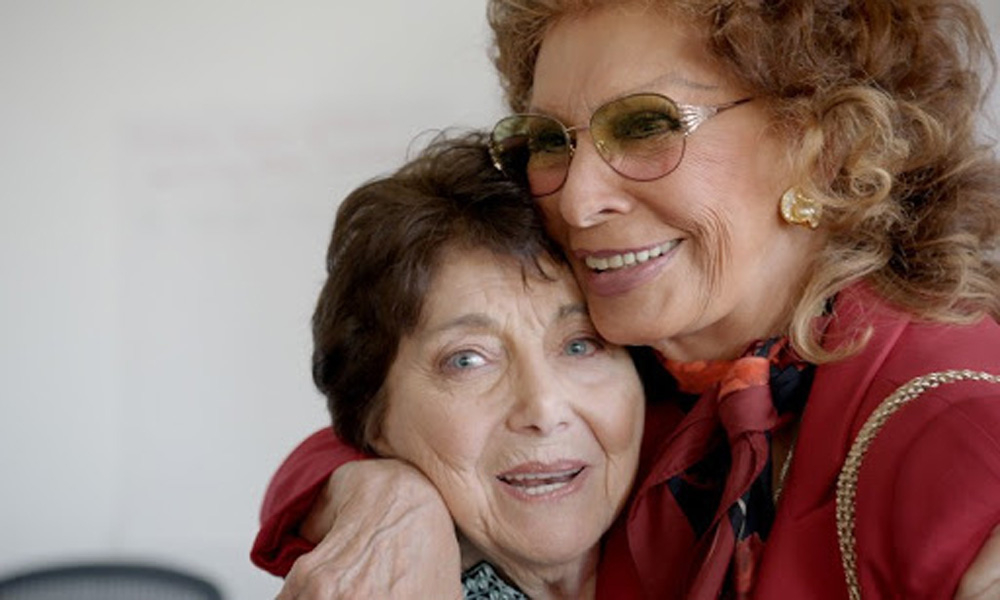In 2016, Ross Kauffman and Regina K. Scully met for the first time at a dinner through their mutual acquaintance Geralyn White Dreyfous, who produced Kauffman’s Oscar-winning documentary “Born Into Brothels” and many more alongside Scully in the years that followed such as “The Invisible War” and “Step,” and when the two arrived before Dreyfous did, they quickly got to talking, seemingly having plenty in common given their background in hard-hitting, socially conscious filmmaking. However, the conversation really picked up when both were thinking about doing something different.
“We didn’t know each other at all, but right away, the first thing that each of us said was, “You know what? I want to make a film about joy,” says Kauffman. “We need more joy in our lives in terms of the media, in terms of what we put out into the world in terms of documentaries and right away, we knew we had to do this.”
For all the incredible stories Scully has brought to the screen through her production company Artemis Rising, it would turn out she had one within her own family — actually two, as she’ll explain later — and soon enough, would introduce Kauffman to her mother Nancy “Vincenza Careri” Kulik, an infectiously upbeat nonna in Fort Lee, New Jersey who will remedy nearly anything life throws at her by asking “What would Sophia Loren do?” In a film that takes its name from that question, Kauffman not only offers the pleasure of spending a half-hour in the company of the gregarious Kulik, but reveals that while she grew up idolizing Loren, a paragon of elegance and grace in such films as “Two Women” and “El Cid,” she was equally admirable in her poise and resolve, giving her family the best life they could have even when times were tough.
Although “What Would Sophia Loren Do?” gives Kulik a much-deserved opportunity to be a movie star, the film turns the spotlight towards Loren in a different way, using the occasion of the legendary actress’ first feature in over a decade “The Life Ahead,” directed by her son Edouardo Ponti, to suggest beneath the glamour she didn’t have it any easier than Kulik in getting what she wanted out of life. Introduced a world away from each other in every respect, the regal pair are drawn closer to one another with each passing minute in Kauffman’s delightful short and are bound to pull you in as well with their tender recollections of the rich lives they’ve led. With the film premiering on Netflix this week, Kauffman and Scully shared how they teamed up to bring a bit of happiness to homes everywhere at a time when a tale of perseverance is bound to be especially inspiring.
How did this come together?
Regina K. Scully: Ross had worked with me and my husband — we made another gem of a short called “Still Plays with Trains,” which is about my husband’s incredible model train art installation that’s going to a museum next year — and that film led to this film. I said to Ross, I really want to make a film about my mom, my Italian heritage and why we are the people we are because of the people that we’re raised by or the people we meet along the way. Like how do we get to be who we are? I was raised with a woman who would say to me, whenever I got a little bit too American in my ways, “Regina, what would Sophia Loren do?” And it was the spiritual and chiropractic adjustment I needed to get my feet back on the ground, like don’t ever forget who you are and what your values are.
I started sharing this phrase and these stories with different people and we got such an incredible reaction to it I just brought it to Ross and I said, “I think we have a film here. This is the title, this is the person, this is the ethos.” And of course love translates into every relationship and every language, so it really opened up into being a film about resilience and joy, which everyone can relate to.
Ross Kauffman: Yeah, the joy makes all the difference. In the midst of COVID and in the midst of all the difficulty we’re experiencing [now], making this has been a real healing experience. I can’t be thankful enough for just the experience of making it in this time, no less making a film that you’re proud of. I’ve worked in war zones and brothels and a lot of really difficult subjects and not always, but most of the time you can find the joy in the sadness and that’s what we did here. And Regina has worked on some of the most intensely difficult topics, so for us, turning this around and making something joyful was very important to us.
Regina K. Scully: Yeah, joyful and very healing too. And it’s so true Ross – look at where you’ve been and the films you’ve done and look at my group [where] we’ve done over 200 social justice documentaries, all of them in the area of recovery, broadly defined. We can’t ever forget that joy, laughter, and humor because those are just as powerful healing tools as anything else in the toolbox.
Was this actually produced in conjunction with “The Life Ahead” or was that serendipity?
Regina K. Scully: [“The Life Ahead” came] later.
Ross Kauffman: It’s a 32-minute film, but we started this in 2017. When Regina came to me and said, “My mom has this great phrase, ‘What would Sophia Loren do?’ Want to make a film out of it?” The first thing I thought was, “Well, at least we have a title to our film because that’s always a hard thing to figure out.” But at first, you think about this phrase and it doesn’t seem to have the depth and the resonance [to sustain a film] and I thought, “Oooh, I don’t want to just make a fluff piece.” But as soon as I met Regina’s mom, I knew we had a great shot at making a beautiful piece that has more than just surface meaning of what Sophia Loren would do.
I like to take my time with these things and Nancy’s very open and wonderful, but it really took time for her to start sharing the really difficult challenges that she’s had in her life, to the point where I had no idea some of the challenges she faced along the way, [so] little by little, over the two or three years of making it, a real depth came to the fore. That’s where I got really excited because I thought, “Oh, this isn’t just a film about a sweet phrase. This is a film about life, about loss, it’s about love, it’s about resilience, it’s about vulnerability.” And we never intended Sophia to be in this. This was just going to be Nancy, but I think wonderful filmmaking is to just follow my nose and all along the way, we’d have something going on. I’d say to Regina, “What do you think about this?” And Regina would say, “Ross, maybe we should do this” and little by little, the film really became something with a lot of resonance.
Regina K. Scully: This film never could’ve happened without a divine constellation of people, events and support. At every turn, Stephen, something miraculous was happening. A deadline changed or this person said, “Oh my gosh, this film has this or that” and it was one thing after another and one person after another, including Ross and I getting together to work on it. The whole thing was just extraordinary from start to finish, from start to finish. And it’s still going on.
Regina, do you learn anything about your own family history you may not have known without the pretense of a documentary?
Regina K. Scully: I learned more of just how resilient my mom and my family is. I’ve always believed in the power of love, but it’s such a testimony to how much we can really endure because life is just a series of twists and turns. So it all comes down to the tools we have in our toolkit to navigate that, and [I recognized], “Wow, this is quite a little toolbox that my mom has assembled, both from her ancestors and then passed down to our family.” So that was remarkable. I knew the actual events, but in terms of just the depth and the ability to navigate, that was a whole new level of revelation for me.
Ross Kauffman: And one thing I found interesting is Regina didn’t push [her] mom to share things, and I thought that was wonderful because little by little, Nancy would share with us what she wanted to share, so at a certain point when she starts to talk about some of the real challenges, it was because Nancy wanted to and not because Regina said, “Ask my mom about this.” Our jaws were dropping when Nancy would tell us certain things because we had no idea and that’s a testament to Regina and the trust that not only she has with her mother, but also the trust that Nancy really gave us and shared with us. We’re like family now.
Regina K. Scully: Oh absolutely. These stories are hers to tell and it’s a testimony to [Ross] as a director and Robin Honan, our wonderful producer, that she really just formed a very comfortable bond and also she knew she had me by her side through the whole thing. Because she lost a son a few years ago, she doesn’t shy away from it, but it was the first time I’ve seen her be more free about talking about it, so that was wonderful for her to talk about it more in the context of her whole life.
Ross Kauffman: Yeah, my hope whenever people go to these painful places is that it’s a form of healing for them. In all the movies I’ve done, taking people to those painful places, it’s always been positive for people. It’s always a release that people want to tell their story and Nancy, I think she feels the same.
After Sophia Loren actually becomes a part of the film, did you know there was such a strong connective tissue in terms of the theme of motherhood?
Ross Kauffman: I can answer that very clearly. No. [laughs]
Regina K. Scully: But Nancy did. [laughs]
Ross Kauffman: As a filmmaker, I knew Sophia Loren’s films and that she symbolized grace and dignity and femininity, but it was eye-opening to really delve into it and see two women back and forth, who on the surface, you think are so different and find out in the editing not only how similar they are, but how similar we all are. It doesn’t matter where we come from or our backgrounds. We all experience these facets of human life and we deal with them in our own ways. When I first started, I didn’t think these two paths would merge the way they did and in such a beautiful and emotional way.
Regina K. Scully: Nancy knew that their lives had a parallel. That’s why she always admired Sophia. She knew she had gone through to have her children and that she came from a very poor background and Sophia had a lot more depth than just being seen as a sex symbol and a star. That’s why she would say to me, “Regina, what would Sophia Loren do?” Ross was a genius in that he brought [Sophia’s] films into the movie. [My mother] had seen “Two Women,” the one that got the Academy Award, and knew the depth of that, so when Ross said, “Nancy, if we show you some of these films, tell us what you felt about them,” I thought that was genius what Ross captured.
Ross Kauffman: That was fun. Again, it’s about the full spectrum of a person’s life and in this specific case of two amazing women, about femininity, vulnerability, grace, beauty, resilience, love and for me, those are very feminine qualities, and it’s also a celebration of the maternal — of mothers and grandmothers.
Regina K. Scully: And connection. I think the reason it’s more powerful during COVID is because if anything we’ve all learned how as human beings, we really need connection. We had no idea there would be so many parallels between the two and because of COVID, [this film and “The Life Ahead”] weren’t even supposed to come out at the same time. That’s why I go back to the divine constellation of things and people, but they did coincide and Sophia has got such generosity of spirit and humanity and heart. She did so many things that she didn’t have to do just because that’s who she is as a human being and as a person and it just spills over into her work and how she approaches raising her children and being a grandmother. It’s pretty miraculous and beautiful.
Ross Kauffman: And I just want to say about Sophia, when it turned out that we had a chance to interview Sophia, I’m not usually nervous when I’m interviewing people. I was nervous when I was interviewing Sophia.
Regina K. Scully: Who wouldn’t be? [laughs]
Ross Kauffman: We had a lot of fun in that interview, as you could see in the movie, and she was wonderful and very graceful.
Has Nancy gotten a chance to see the film yet?
Regina K. Scully: My mom loved it. She and my dad were the first people who got to see it and they’re just kind of taking it in with quiet equanimity and gratitude because they’re like, “Wow, this is our life.” They just never thought it would be reflected back like that. And my brothers too, my surviving brothers, they were all realizing, “My God, we’re all so grateful to have each other and that we still have my parents,” just feeling every day in your bones that every day is a gift.
“What Would Sophia Loren Do?” starts streaming on Netflix on January 15th.




